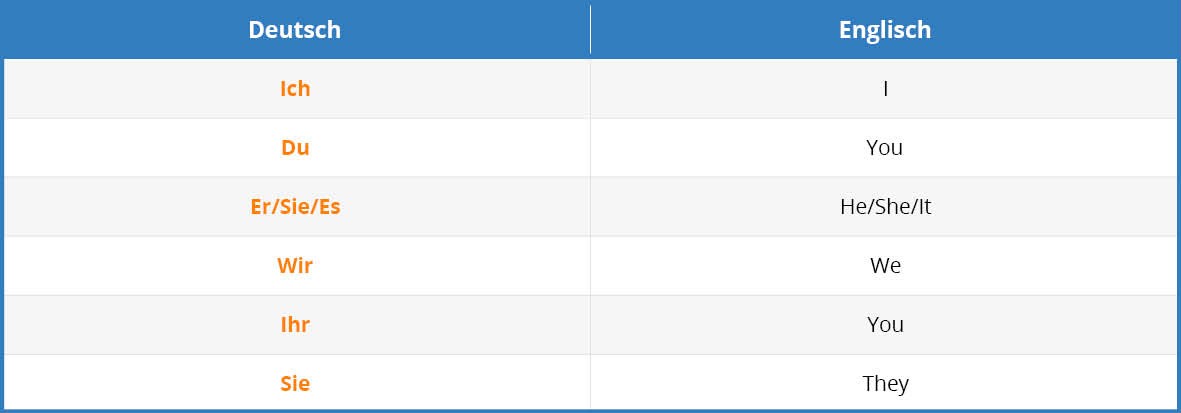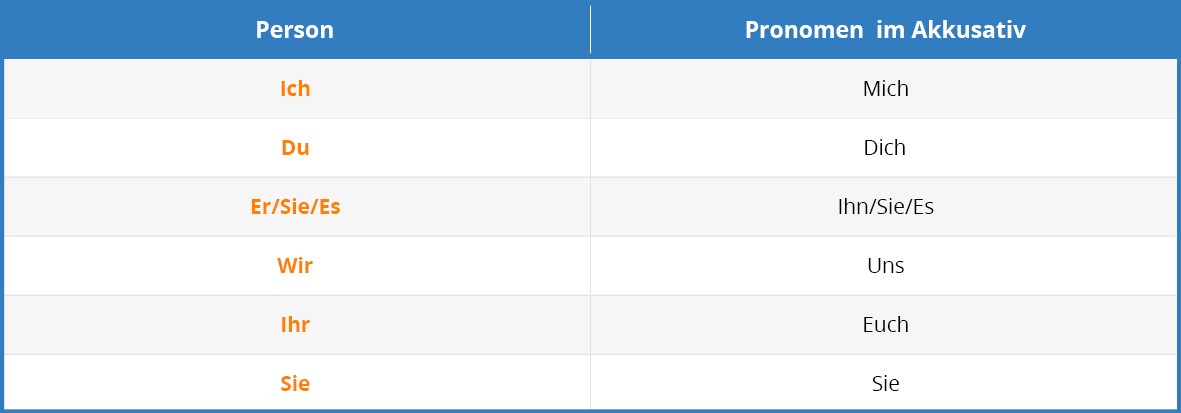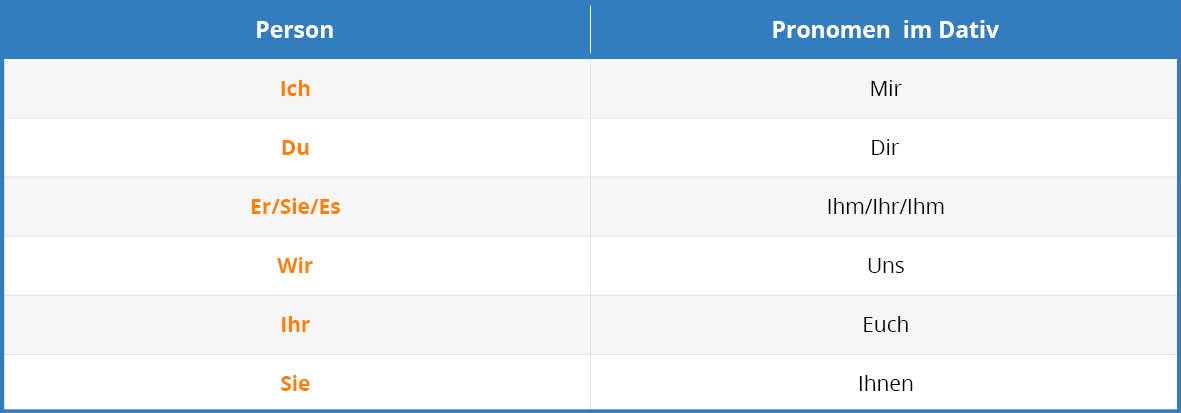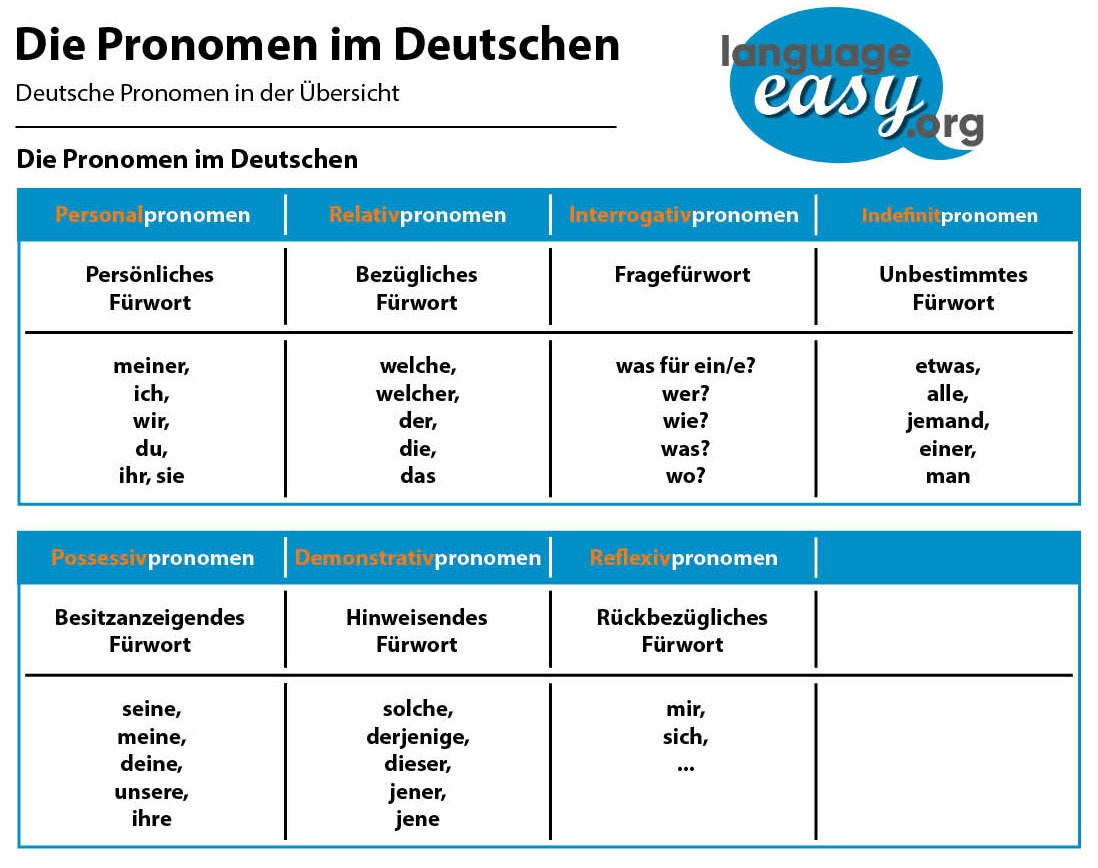German Pronouns
Verben im Deutschen – Erklärungen und Beispiele
German Pronouns – Summary
Zusammenfassung
Pronouns can either replace or accompany a noun. Most pronouns change their form, due to gender, number or grammatical case. There are different types of pronouns:
- Personal pronouns “ich, du, er/sie/es; wir, ihr sie”
- Reflexive pronouns “mich, dich, sich; uns, euch, sich”
- Possessive pronouns “mein, dein, sein/ihr/sein; unser, euer, ihr”, …
- Demonstrative pronouns “dieser, diese, dieses; diese (hier), jener, jene, jenes; jene (dort)”
- Relative pronouns “der, die, das; die, welcher, welche, welches; welche”
- Interrogative pronouns “wer, welche(r/s), was, wie, wann, wo, warum”, …
- Indefinite pronouns “man, jeder, jemand, etwas”, …
Well, congratulations! You have clicked on this article about German pronouns on language-easy.org. Of course, it’s obvious – your German must have already reached a great level. So, let’s go into details and improve it even more.
German pronouns are an essential part of German grammar, as well as adjectives for example. Well, they are also considered to be rather complicated, as they depend on a lot of other grammatical factors.
Hopefully, this article will help you to understand the basic structure and functions of German pronouns.
The Difficulty of German Pronouns
Die Schwierigkeit bei Pronomen im Deutschen
As I have already mentioned, German pronouns can be quite difficult sometimes. Well, there are various reasons, but mainly the difficulties of German pronouns comes from their changes depending on different grammatical factors. Here, I have listed some of them.
- First, there are changes in the form of German pronouns based on the grammatical case being used. So, depending on whether nominative, dative or accusative is used, the pronoun changes.
- Second, especially possessive pronouns depend on the grammatical case, but also on the gender of the object.
- Third, German pronouns change depending on whether they precede a noun or whether they describe a previously mentioned noun.
Yeah, I know – all that sounds so complicated. But don’t cry now. Let’s try to structure and understand the concepts of German pronouns in the following.
The Basic German Pronouns
Die grundsätzlichen Pronomen im Deutschen
First of all, we will list some basic German pronouns. So, you can structure them into nominative, accusative and dative pronouns. Please, note that we will not talk about German possessive pronouns in this article – it’s a broad topic and I thought, it’s worth writing an article on its own apart from this one.
The Basic Nominative Pronouns
So, this is maybe the easiest part of German pronouns, the nominative pronouns. Well, as you might already have thought, these German pronouns are used as a subject of a sentence. In the following, I will show you a list of nominative German pronouns.

Of course, this is total basic German grammar. Nevertheless, you should master it completely in order to go into some more complicated topic. Now, we will come to the next kind of German pronouns, the basic accusative pronouns.
The Basic Accusative Pronouns
So, another very important part of German pronouns are the accusative ones. This kind of pronouns is mainly used when the pronoun is the object of a sentence. But you also have to keep in mind that a lot of accusative pronouns are the same as the nominative pronouns.

Here are some examples for the use of accusative German pronouns.
- “Das Geschenk ist für dich.” – The present is for you.
- “Sie liebt mich.” – She loves me.
The Basic Dative Pronouns
Unfortunately, dative pronouns differ much more from nominative than accusative pronouns. So, they are used as the indirect object in a sentence. Here you have a list of the basic dative German pronouns.

Of course, here are some examples that illustrate the basic German pronouns.
- “Ich geben dir ein Geschenk.” – I give a present to you.
- “Sie helfen Ihnen.” – They help them.
As you might have noticed already, this text is just a superficial overview about the broad topic of German pronouns. In the following you can find the different articles on language-easy.org about pronouns in the German language. So, in case you’d like to get some more details about each specific pronoun, just click on the corresponding button.
Some Last words…
Einige letzte Worte…
Finally, we have come to the end of this rather short article about pronouns. Well, as I have already mentioned, possessive pronouns in German have not been a topic in this article. They are a little more complex than these rather basic pronouns here, so there is an article only about possessive pronouns. Just click on this link and it will redirect you to the page about this kind of pronoun.
So, I hope you could understand the basic structure of pronouns and also the lists could serve you as important vocabulary. Well, just try to keep the rules in mind mentioned above and you will see that German basic pronouns are far less complicated than you might have thought.
Please, note that there is also another article about reflexive pronouns and, of course, about demonstrative pronouns. Just click on the links and you will be redirected.



